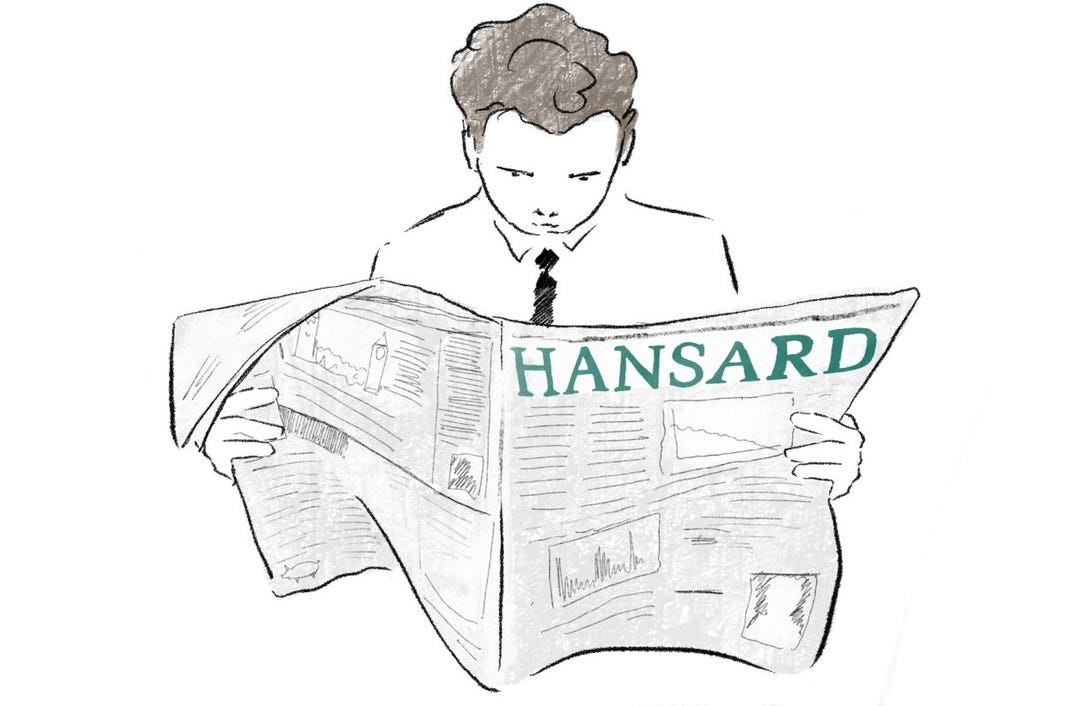UK MPs go to Taiwan, Indo-Pacific trip, Newport Wafer Fab, Hong Kong Watch report
A Beijing to Britain briefing
Hello,
The Foreign Affairs Committee goes to Taiwan this week. Speaking to this Briefing earlier, Committee Chair Alicia Kearns said:
“We are in Taipei to learn - it is only through listening to Taiwan that we can move forward with further deepening bilateral cooperation. There are myriad material ways that the U.K. and Taiwan can benefit from one another, whether it be expanding trade and investment, tech partnership building, or people-to-people exchanges. But we shouldn’t skirt around the high-level motives behind this trip. We want to show the UK is fully committed to ensuring Taiwan continues to thrive as an outward-looking democracy and is allowed to play an active role on the international stage.”
This trip has been in the works for months and postponed on a number of occasions. It comes against the backdrop of increased Parliamentary interest in the future and security of Taiwan, and a local election on the island. I will be keeping track of key meetings, statements and media coverage for paid readers, and watching closely to see what reaction comes from the Chinese side.
While the invasion of Ukraine rightly became the foremost foreign policy issue for Britain over the last year, Taiwan is absolutely on the SW1 agenda. At the macro level, the UK’s wider Indo-Pacific tilt promised in the Integrated Review remains underway despite concerns about overreaching. As you read this Briefing, Minister for the Indo-Pacific Anne-Marie Trevelyan is on the move in Australia, having just arrived from Vanuatu. She’s spent the last five days meeting Pacific leaders, listening to their priorities, and promising to aid them in their most pressing battle - which they seem to have told her is climate change, not China. Let’s see how much of their feedback filters into the Integrated Review refresh - and if Taiwan is mentioned this time.
Elsewhere in today’s Briefing, new research this week revealed 11 local pension funds in the UK are passively invested in at least 13 Chinese companies where there is credible evidence of involvement in Uyghur forced labour programs and construction of internment camps in Xinjiang. In my view, the space around funds and passive investments in China remains under-scrutinised in the UK, and could end up being a Pandora’s Box for larger issues around economic security and dependency on China that are yet to be properly analysed. Hong Kong Watch has led the charge on this, and I suspect this theme will become a focus area for some organisations and individuals over the coming months.
Finally, following last week’s Government intervention on the sale of UK semiconductor firm Newport Wafer Fab, MPs gathered in the Commons to try and squeeze more insight from the Business Secretary. As commentators and lobbyists have told me repeatedly, their concern with this case is that the remit for intervention is too vague. By refusing to share more details, they argue, the Government creates the one situation the business community hates - uncertainty.
That’s all to come in this week’s Beijing to Britain.
— Sam Hogg, Editor.
Order! Order!
Some of the more eye-catching questions and tweets from Westminster dwellers this week
Anne-Marie Trevelyan (Minister for Indo-Pacific) tweeted “Ongoing harassment of pro-democracy supporters & civil society organisations in Hong Kong, including of Cardinal Zen Ze-kiun is unacceptable. Its vital Hong Kong people are allowed to associate freely without fear of arrest & detention
@FCDOGovUK”
Lord Alton (IPAC) asked “His Majesty's Government whether the brief of the new Trade Envoy for the Indo-Pacific includes the promotion of trade with China.”
Politics
British diplomacy
UK and the Indo-Pacific
“On my first trip as Minister for the Indo-Pacific, I want to underline the UK’s steadfast commitment to the region and how we can work together to bolster global prosperity and security,” declared Minister of State for the Indo-Pacific Anne-Marie Trevelyan (AMT) (whose portfolio includes China) as she touched down in Vanuatu. “The UK will deepen our engagement in the Pacific, a region where we have a close history, many friends, and share the values of sovereignty, territorial integrity and free trade.”
AMT, recently demoted to this role following the arrival of Prime Minister Rishi Sunak, is on a nine-day tour of the region for two reasons: first, to shore up Britain’s commitment to Indo-Pacific nations that it will help them address climate change and security concerns, and second, to discuss trade and security issues with her Australian counterparts.
In the case of the former, the Minister addressed the climate emergency currently facing the Pacific community - a huddle of countries defined this week by the Government as including India and Indian Ocean (Bangladesh, Bhutan, India, Maldives, Nepal, and Sri Lanka), North East Asia (China, Hong Kong, Japan, Mongolia, North Korea (DPRK), South Korea (RoK), Taiwan), South East Asia (Brunei, Cambodia, Indonesia, Laos, Malaysia, Myanmar, Philippines, Singapore, Thailand, Timor Leste, Vietnam) and Oceania (Australia, Fiji, Kiribati, Marshall Islands, Micronesia, Nauru, New Zealand, Palau, Papua New Guinea, Samoa, Solomon Islands, Tonga, Tuvalu, and Vanuatu).
Speaking at the 12th Conference of the Pacific Community “to build closer diplomatic ties with leaders from across the region”, AMT’s statement reflected the UK’s diplomatic push in the region, which is increasingly anchored in climate and security diplomacy. She noted “there is no greater priority for many Pacific Islands than climate change”, and that the United Kingdom is “driving global action to tackle barriers that vulnerable small island developing states face in accessing essential finance. The international community must work better together to support your resilience building.” In the Government’s press release, significant mileage was given to the Blue Planet Fund “which will support economic development while protecting nature and increasing climate resilience.”
The second leg of AMT’s journey took her to Australia, where she remains at this Briefing went to press. Here, she will meet Minister for Foreign Affairs Senator Penny Wong, and Deputy Prime Minister and Defence Secretary Richard Marles “to discuss how the UK and Australia can deepen their defence and security partnerships to support a stable, prosperous Indo-Pacific.” AUKUS is also on the cards, as is a speech at the Australian National Press Club tomorrow. Good news for those who care about the Indo-Pacific - AMT is recording a podcast with Australia’s influential Professor Rory Medcalf on the geopolitical challenges facing the Indo-Pacific this week too.
Elsewhere, AMT is on track to discuss the Comprehensive and Progressive Agreement for Trans-Pacific Partnership, or CPTPP. For those not following closely, the UK’s effort to join this massive trading bloc has come under criticism of late - the former Tory Environment Secretary, George Eustice, told the Spectator this week he is ‘genuinely worried’ that this effort will go the same way as the Australia deal. “I felt it was important that I fired a bit of a warning shot, so that they recognise that it’s not a cost-free option to throw farming under the bus.” Minister for Trade Policy Greg Hands (recently returned from Taiwan) then made the case for it in ConservativeHome.
Taking a step back, the macro context that frames this visit can be found in the UK’s steering foreign policy document, the Integrated Review, which promised that “by 2030, we will be deeply engaged in the Indo-Pacific as the European partner with the broadest, most integrated presence in support of mutually-beneficial trade, shared security and values.” Since then, the UK has joined an American initiative, the ‘Partners in the Blue Pacific’ alliance, and although the IR was published two Prime Ministers ago and is now undergoing a ‘refresh’, its Indo-Pacific themes live on. Readers will remember that when Prime Minister Sunak attempted to meet with General Secretary Xi Jinping at the G20, Downing Street sent out a press release titled “Prime Minister: the UK will be a firm friend to the Indo-Pacific”. However, concerns remain that the UK is not engaging with nations in the region in an intelligent way, and that it could be over-ambitious and stretched. Regardless, Indo-Pacific diplomacy is here to stay, at least in rhetoric.






